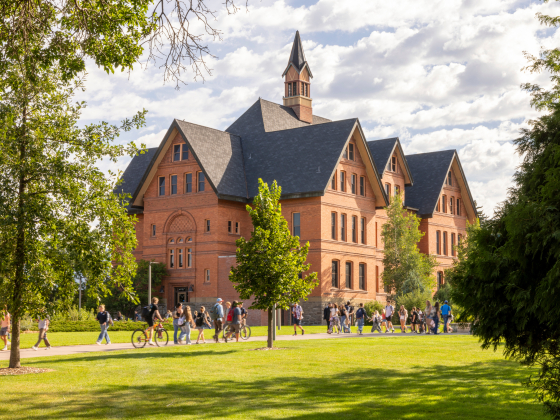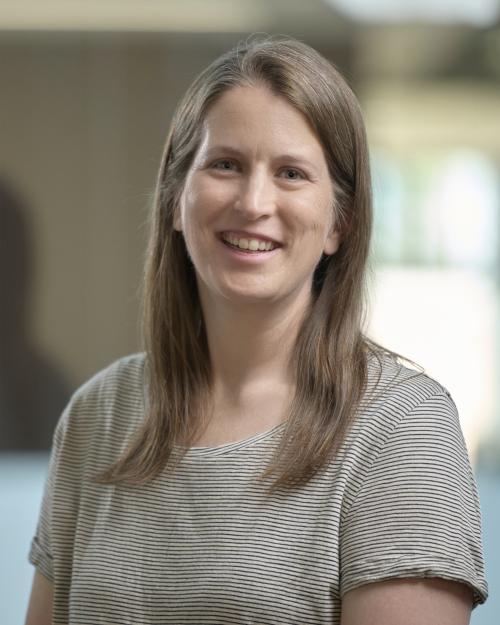For Elizabeth Arnold, mathematics has always been a family affair.
While growing up, she spent lots of time solving problems and mathematical puzzles with her father, a now-retired community college professor of mathematics. She remembers going with him to campus as a fourth grader on “Take Your Child to Work Day,” attending his lectures and listening as he helped students during his office hours.
“I’m pretty sure I also pretended to grade homework papers and loved it,” said Arnold, now an assistant professor of mathematics education at Montana State University. “I knew very early on that I wanted to major in mathematics and become a teacher.”
As a starry-eyed college student majoring in math, Arnold attended her first professional conference, co-sponsored by the Mathematical Association of America, with her dad. Later this summer, she again will attend an MAA meeting, but this time as a star.
Arnold will receive one of the organization’s top national honors, the 2025 Henry L. Alder Award, which recognizes early-career faculty whose teaching has been exceptionally successful and whose impact on undergraduate mathematics education extends beyond the classroom. Nominees for the Alder award are previous recipients of a regional MAA Early Career Teaching Award, which Arnold received in 2024 for the association’s Rocky Mountain Section.
“It’s kind of neat to come full circle,” said Arnold, who a year ago — in similar circular fashion — joined the faculty of MSU’s Department of Mathematical Sciences in the College of Letters and Science, where she earned one of her two master’s degrees and a Ph.D. in mathematics education.
Soon after being notified that she had won the award, Arnold received more good news from the MAA: that she has been awarded a Neff Outreach Grant for a mathematics initiative she developed for youth and families from the Northern Cheyenne community of Montana.
The project, Navo’ėstanemo: Summer Math Modeling and Family Math Nights, builds on Arnold’s enthusiasm for mathematics as a family activity. The first element is a two-day immersive summer camp for youth focused on mathematical modeling, the process that uses math to analyze, make predictions and provide insight into real-world phenomena. Camp content will be designed to address problems relevant to the students’ own backgrounds and experiences.
“We’ll show them, ‘Here’s how you engage in math modeling. Here’s how you do mathematics. It’s not just you sitting at a desk writing a bunch of equations,’” said Arnold, who emphasizes the importance of well-designed models to her MSU students who are studying to become teachers — and even those who aren’t.
“A lot of undergrads who take the math-major courses go on to graduate school, where they will be teaching, or others will be teaching in some other kind of capacity,” Arnold said. “I like to expand their view of the different kinds of careers that you can do with mathematics and the different kinds of problems you can focus on.”
Navo’estanemo also will feature two family math nights geared toward elementary school students, their families and community members. All will gather for provided dinners, and participants will engage in fun, hands-on activities that foster learning and curiosity while celebrating family, language and heritage.
Arnold said she modeled the Northern Cheyenne curriculum after Cafecito con Matemáticas, a program for Spanish-speaking families that she co-created as an assistant professor at Colorado State University before coming to MSU. The interactive event, offered in both Spanish and English, built family and community engagement with mathematics while incorporating traditional cultural elements.
“It’s just nice to see families and the students smiling and having fun, because I feel like math is often perceived as ‘Ugh! Yuck!’ and not fun,” Arnold said. “We took inspiration from community members – even grandmothers who talked about playing hopscotch as a kid – and we incorporated those ideas into the event.”
Arnold was chosen for the Alder award because of her “inspiring and inclusive approach to teaching, which ignites a passion for learning in her students and enriches the broader mathematical community,” according to the MAA website.
Elizabeth Burroughs, head of MSU’s Department of Mathematical Sciences, agreed that Arnold is well deserving of the honor.
“I’m consistently impressed by Liz’s creativity in the classroom,” Burroughs said. “She brings the disposition of a scholar – curiosity, diligence, focus – to her teaching and adds to it her spirit of empathy and her high standards for students.
“The result is an award-winning teacher.”


